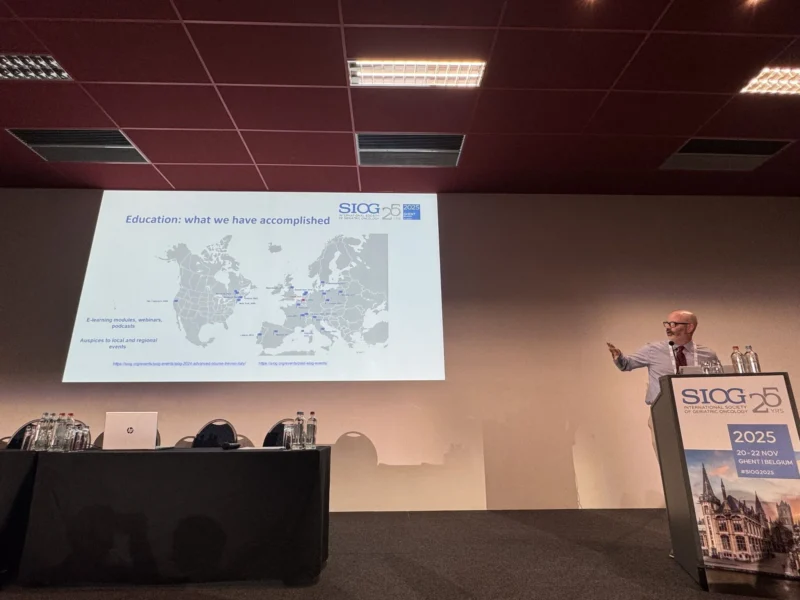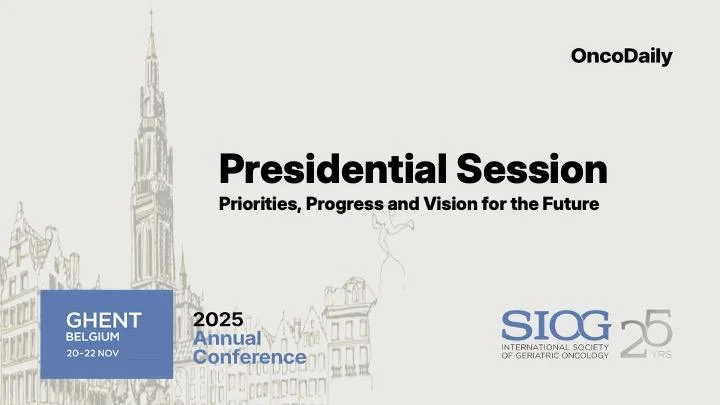Fresh from the concluding Presidential Session at SIOG 2025 in Ghent, the final moments of the congress offered both reflection and direction. SIOG President Grant Williams, MD, MSPH, FASCO, a radiation oncologist with experience spanning academic medicine and community practice, delivered a closing address that captured the core mission of SIOG and the work still ahead. His message was grounded in clarity: the future of cancer care depends on education, strong research, practical implementation of geriatric principles, and genuine partnerships across the oncology community.
A Reminder of the Reality: Most Cancer Patients Are Older Adults
Dr. Williams began by restating a truth that defines SIOG’s mission. Around the world, most patients with cancer are older adults. This means that whether or not clinicians use the label, “almost every oncologist is a geriatric oncologist.” His message was not directed at those gathered in the room—experts who actively engage in this field—but at the many colleagues who remain unfamiliar with or do not routinely apply geriatric frameworks in day-to-day practice. Bringing these tools into routine cancer care, he emphasized, remains one of SIOG’s most important responsibilities.

Building a Stronger Foundation: Education, Research, and Daily Practice
In his address, Dr. Williams thanked the Scientific Committee of SIOG 2025, the meeting chairs, and SIOG’s partners, acknowledging the collective effort that shapes the congress each year. He highlighted key educational and structural initiatives, including the SIOG Masterclass, the Treviso Advanced Course, newly developed task forces and guidelines, the SIOG Consortium, and the growing work of SPARK with patient advocates. These, he stressed, form a vital backbone for progress—ensuring that geriatric oncology becomes embedded not only in research but in everyday clinical decisions worldwide.
Honoring Excellence: SIOG 2025 Awards
One of the most anticipated parts of the session was the recognition of outstanding contributions across the field. The following awards celebrated individuals advancing the science and practice of geriatric oncology:
- Paul Calabresi Award – Florence Canouï-Poitrine
- Nursing, Allied Health, and Scientists Investigator Award – Marielle Jensen-Battaglia, PT, DPT, PhD, GCS
- Young Investigator Award – Pallawi Torka
- National Representative Award – Carolina Gómez-Moreno
- BJ Kennedy Best Poster Award – Tina Lamy and Samuel Yates
The session also featured the Arti Hurria Journal of Geriatric Oncology Annual Award, presented by Editor-in-Chief Supriya Mohile, recognizing two influential studies published this year. The first was a systematic review and meta-analysis titled “Start low, go slow,” led by Gabriel Alexio and colleagues, which explored evidence-based approaches for tailoring treatment dosing in older or vulnerable adults with advanced solid tumors. The second, from Jia Li Low and colleagues in Singapore, demonstrated that geriatric assessment and G8-based interventions can improve health-related quality of life—showing that geriatric oncology not only illuminates clinical data but can meaningfully change patient experience.
A Turning Point for Geriatric Oncology
For many attendees, this session encapsulated the very essence of SIOG’s mission. It highlighted the organization’s commitment to recognising individuals whose work is shaping the future of geriatric oncology, while also strengthening the structural foundations needed to support long-term progress. From education and clinical frameworks to multicountry research collaborations, SIOG continues to build systems that can elevate geriatric principles into everyday practice.
The atmosphere in the room was both celebratory and forward-looking, reflecting pride in what has been achieved and a clear understanding that the work ahead remains substantial. It was a reminder that advancing care for older adults is a shared global responsibility—one that requires collaboration across institutions, disciplines, and borders to ensure that geriatric oncology becomes fully integrated into mainstream cancer care.
Looking Ahead: SIOG 2026 and Beyond
The session closed with an announcement of the next chapters. SIOG 2026 will take place in Valencia from 6–8 November, followed by SIOG 2027 in Tokyo. These future meetings promise to continue the momentum, bring new voices into the conversation, and further strengthen the global geriatric oncology community.
For more infomation click here.


